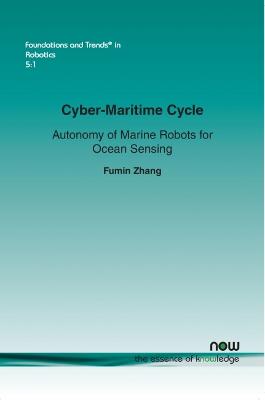Foundations and Trends (R) in Robotics
1 total work
Marine robots are being increasingly deployed in environmental sensing and ocean observation applications. The key challenges in mobile ocean sensing are to design and control the motion of the robots to collect Lagrangian data over a large spatial domain, and then convert these Lagrangian data streams into Eulerian spatial-temporal maps for scientific and operational benefits.
This monograph introduces cyber maritime cycle as a collection of feedback loops where the flow of data is regulated by functional blocks of autonomy. As a new development, the split between the data-driven cycle and the geo-scientific modeling cycle allows the separation of data streams with different time and spatial scales. This separation allows the conversion between Lagrangian and Eulerian data representations to happen more frequently for navigation of marine robots.
This monograph introduces the overall systems architecture and patterns for data streams that enables autonomy for marine robots towards environmental sensing applications. It is an ideal reference for researchers, students or practitioners already doing research in this field, or planning to do so.
This monograph introduces cyber maritime cycle as a collection of feedback loops where the flow of data is regulated by functional blocks of autonomy. As a new development, the split between the data-driven cycle and the geo-scientific modeling cycle allows the separation of data streams with different time and spatial scales. This separation allows the conversion between Lagrangian and Eulerian data representations to happen more frequently for navigation of marine robots.
This monograph introduces the overall systems architecture and patterns for data streams that enables autonomy for marine robots towards environmental sensing applications. It is an ideal reference for researchers, students or practitioners already doing research in this field, or planning to do so.
